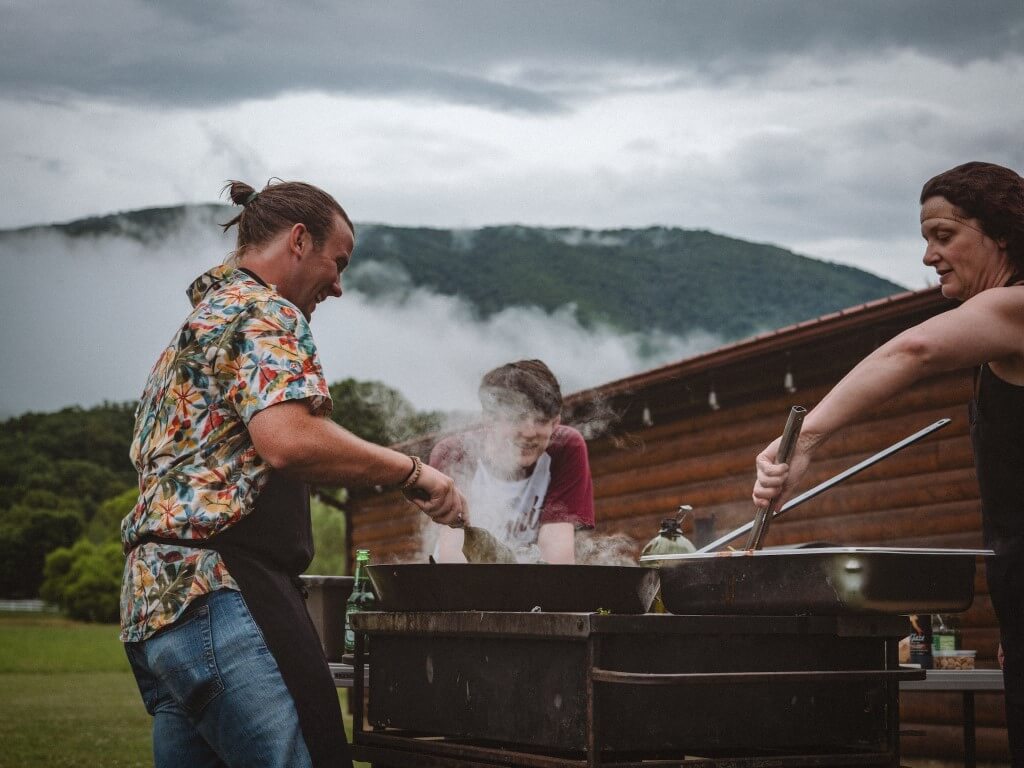The Gas Advantage
When it comes to gas grills, efficiency is the name of the game. They ignite quickly and reach desired temperatures swiftly. This means you’re spending less time waiting and more time grilling. The even heat distribution across the grates ensures that your food cooks uniformly, reducing the risk of overcooked or undercooked sections. Moreover, gas grills typically come with precise temperature controls, allowing you to fine-tune the cooking process to perfection. This means you have the power to achieve consistent results, meal after meal.
The Charcoal Crusade
Charcoal grills bring an entirely different dimension to the grilling experience. The choice of charcoal introduces a distinctive smokiness to your dishes, a flavor profile that is hard to replicate with gas. This characteristic comes from the organic compounds present in the burning wood or charcoal itself. Additionally, there’s an undeniable sense of tradition associated with charcoal grilling. It’s a method that harks back to our ancestors, a link to primal cooking techniques that have stood the test of time. The process of tending to the coals, stoking the flames, and controlling the heat requires a level of skill and engagement that some find immensely rewarding.
Gas’s Consistency vs. Charcoal’s Character
Gas grills excel at consistency. With precise temperature controls, you have the ability to replicate the same results each time you grill. Steaks can be cooked to the exact level of doneness you desire, and vegetables can be perfectly grilled without fear of burning. On the other hand, charcoal grilling introduces an element of unpredictability. The intensity of the heat can fluctuate depending on various factors like wind, charcoal placement, and airflow. While this may require a bit more finesse, it also contributes to the unique character of each grilling session. Some argue that this unpredictability is what gives charcoal-grilled food its distinct charm.
Gas’s Efficiency vs. Charcoal’s Charisma
In terms of environmental impact, gas grills are generally considered more efficient. They burn cleanly and produce fewer emissions compared to charcoal. This means they have a smaller carbon footprint and are less harmful to the environment. Additionally, gas grills tend to use less fuel overall, making them a more resource-conscious choice. On the other hand, charcoal grilling is often critiqued for the environmental cost associated with the production and transportation of charcoal. However, some argue that the natural, elemental quality of charcoal, sourced sustainably, can offset these concerns. It’s a complex topic that ultimately depends on your personal stance on environmental responsibility.
Unveiling the Fiery Debate
In the heart of South Africa, where culture, politics, and race blur into insignificance, one unifying social activity stands tall – the braai. Whether it’s wood, charcoal, or gas, the act of cooking meat outdoors over an open flame is woven into the fabric of South African identity. With its very own National Braai Day celebrated annually on 24th September, it’s a tradition that transcends boundaries.
Health Perspectives
During the braai, the fat that drips onto the hot surfaces undergoes a transformation, giving rise to cancer-causing compounds. These compounds then cling to the meat, becoming part of the dish we consume. It’s a disconcerting reality, particularly for those who relish their meat seared to perfection. To mitigate this risk, experts advocate marinating the food prior to grilling, using oils with high smoke points, such as avocado or high-oleic safflower oil. Additionally, incorporating antioxidant-rich ingredients like rosemary, garlic, cherries, citrus fruits, and green tea into marinades may help counteract the formation of carcinogens.
A recent study conducted by the Faculty of Natural Science at North West University delved into the potential health impacts of the quintessential South African braai. The research revealed that for casual, short-term exposure to braai smoke and gases, significant health risks were not apparent. However, when extrapolated to extended occupational exposure, the hazards became palpable, emphasizing the need for caution in daily grilling routines.
Environmental and Safety Considerations
In the ongoing debate, gas emerges as the cleaner, safer, and more environmentally conscious option. Unlike its counterparts, gas braais bypass the need for tree felling and coal production. This eco-friendly stance aligns with the global call for sustainable practices.
Yet, it’s essential to tread cautiously in the realm of gas grilling. Neglecting proper maintenance can lead to perilous consequences. Regular checks for blockages in hoses and tubes, along with shielding against heat exposure, are imperative. Moreover, gas containers must be stored outdoors and in accordance with safety instructions to mitigate risks.
When it comes to charcoal, it’s worth noting that briquettes contain unhealthy binding agents. Both wood and charcoal emit carbon monoxide during combustion, a pollutant with adverse environmental effects. Thus, while charcoal imparts a distinctive flavor to the braai, it comes with its own set of environmental concerns.
Safety First
Regardless of your chosen fuel source, safety remains paramount. Both gas and wood/charcoal braais carry the potential for fire hazards and burn injuries. The person manning the grill should don a heavy apron and oven gloves to shield against flames and splattering fat.
As you stand at the crossroads of this Braai Battle Royale, consider not only the flavor and tradition but also the health and safety implications of your chosen method. It’s a decision that carries weight, reflecting not only your grilling prowess but also your commitment to health and the environment. The flames await your verdict, and the sizzle of authenticity is in your hands.
FAQ:
Q1: How do I decide between a gas and charcoal grill?
A1: It all comes down to your personal grilling style. If you value precision and efficiency, a gas grill might be your ally. For those who cherish the smoky, time-honored flavor, charcoal is the path to pursue.
Q2: What safety measures should I take when using a gas grill?
A2: Safety is paramount. Regularly inspect hoses and tubes for blockages and wear. Ensure your gas container is stored outdoors and follow manufacturer instructions diligently. Wearing a heavy apron and oven gloves is crucial to protect against burns.
Q3: How can I minimize health risks associated with grilling?
A3: Marinating your food prior to grilling can help create a protective barrier. Opt for oils with high smoke points like avocado or high-oleic safflower oil. Consider using antioxidant-rich ingredients like rosemary, garlic, cherries, citrus fruits, or green tea in your marinades.
Q4: Can I still enjoy the braai experience while being environmentally conscious?
A4: Absolutely. Gas grills are known for their lower environmental impact. If you lean towards charcoal, consider sourcing from responsible suppliers. Look for briquettes with fewer unhealthy bonding agents and practice mindful charcoal use.
Q5: How can I make my braai experience more inclusive and memorable?
A5: Invite friends and family to join you around the grill. Share stories, exchange recipes, and celebrate the experience together. Consider exploring different grilling techniques and flavors to keep things exciting.
Q6: What’s the key to a successful braai, regardless of the fuel source?
A6: The secret ingredient is your passion and presence. Embrace your chosen method, be it gas or charcoal, and let it infuse every sizzle and sear with your unique touch. Remember, it’s not just a meal; it’s an experience crafted by you, for you and your loved ones. Enjoy every moment!
To All Grill Enthusiasts
If you’re captivated by the sizzling debate of Gas vs. Charcoal in the Braai Battle Royale, I invite you to delve deeper into this fiery discussion. Together, let’s uncover the passions that fuel grill enthusiasts in their quest for the perfect braai. Whether you lean towards the precision of gas or the time-honored tradition of charcoal, this exploration is about more than just technique—it’s about your culinary identity. If you’re hungry for more insights or have burning questions about this heated debate, I encourage you to reach out through the contact form. Let’s ignite a conversation about Uncovering the Braai Battle Royale, and together, we’ll take your grilling journey to the next level.




